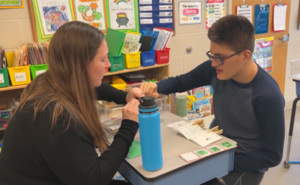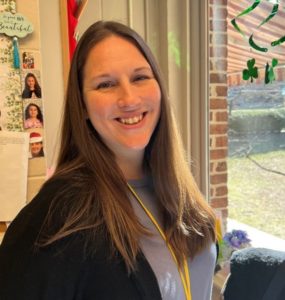Staff Spotlight: Amy Kelly
Growth and Impact: Amy Kelly Pursues BCBA While Teaching at Children’s Education Center
“Whatchu got? One plus, one plus?” Amy Kelly, a teacher at the BCCS Children’s Education Center in Brookville, encouragingly asks during a one-on-one lesson with Hunter, a student in her classroom. Hunter, although inquisitive, gets a bit distracted by the video playing on the smartboard in front of him.
 But Amy gently persisted. She moves the equation card closer to him—patiently waiting. Seconds later, Hunter grabs the card, fully focused “One plus three equals four,” responds Hunter.
But Amy gently persisted. She moves the equation card closer to him—patiently waiting. Seconds later, Hunter grabs the card, fully focused “One plus three equals four,” responds Hunter.
“Excellent” clapped Amy as they celebrated together, and Hunter neatly placed the card on the stack he has been working on.
Amy is growing into her role and starting to come into her own. Although the 2023 school year marks her second year of teaching, Amy has been a BCCS staff member for sixteen years.
Amy started her career at BCCS as a teacher’s assistant. The then nineteen-year-old learned about the job from a friend. At the time, she was waitressing at a local pizza shop and had no experience working with children. Without concrete plans, she took the job figuring that holding a position with daytime hours would be a welcome change.
After Amy joined the Children’s Education Center, she found that she loved having hands-on interaction with the students. Special education programs work with smaller class sizes, increasing the time teachers spend with each child. This allows teachers to reinforce individual education plans, ensuring students are reaching their goals.
After time spent being a part of a child’s learning journey— helping them develop social, motor, and behavioral skills— it dawned on her that BCCS was where she was meant to be.
“I really feel with my path, I was put here for a reason. My whole journey, everything has fallen into place for me here. It’s like the universe aligned,” shared Amy about her experience.
BCCS’s impact on Amy’s life has been unmistakable. She leaned into the many opportunities available to agency employees willing to grow with the agency.
Within the first year of employment, BCCS requires and encourages teaching and behavioral staff to secure mandated professional certificates.
The center offers continuing education options and works with employees to devise a plan to help them achieve their career goals.
“When I found out all the plans and all the things that they do to help people go to school and get an education, I definitely took advantage of that,” said Amy.
She started with a few classes: psychology, early childhood education, and other courses relevant to her position. Then, Amy embarked on a degree program. She found convenience in the ability to work and learn part-time time.
While working at BCCS, Amy received her associate degree at Nassau Community College and completed her undergraduate study at SUNY Old Westbury. Amy is now on track to become a certified behaviorist. Throughout the years, she has only taken time off after her pregnancies. Currently, she is pursuing a master’s degree in special education with a Board-Certified Behavioral Analyst (BCBA) track.
When supporting children with autism, BCBAs assist in determining the root cause of certain behaviors and offer guidance on the best approach to working through challenging situations. 
Unlike other schools, the BCBAs at the Children’s Education Center have an independent role. Although they are certified teachers, they primarily serve as analysts who, rather than teach a class, work alongside teachers to address students’ behaviors as they present themselves in a classroom.
“If there is a behavior happening, we have the walkie system. We’ll call saying, ‘Hey, I need assistance.’ The behaviorist will come and help out,” explained Amy. Assistance may be to verbally guide teachers to address the situation or to offer hands-on support.
Amy’s assigned BCBA makes regular classroom visits to oversee the progress of children who need behavior intervention support, checking how their individualized plans are working in the hopes that overall, there is a track record of reduced behavior challenges.
Also, BCBAs collect data and create reports that shed light on the behavior patterns of each child as they progress during class and certain activities. This data can be extrapolated for BCBAs to create plans, that they help teachers execute with students to promote positive behaviors in a classroom.
Amy acknowledged that although she is still developing as a teacher, she welcomes the growth she will experience as a BCBA. Indicating that her past and current roles have led her to this decision.
“I found out through my experience here that I tend to go towards the students with behaviors,” said Amy. “I like to help them; I want to teach them to communicate.”
She wants to provide such students with the means to express themselves more appropriately, thereby reducing the frustration they might be experiencing. As a BCBA, she can accomplish this by verbally guiding the teachers in ways to diffuse situations.
The best example of this would be to compare the behavior of a typical student. Typical children can pick up on social queues and express themselves in certain situations. Like if they are in an environment they do not like or care to express a want. In a crowded room, a child might say, “I don’t like it here” or “It’s too loud.”
Many children enrolled in BCCS programs have trouble communicating, which may lead to using their bodies to get the attention they need.
Instead of saying, “too loud,” they may cover their ears and make sounds to demonstrate their discomfort. The list of situations that arise and the atypical behavioral responses students present are varied, which makes the role of BCBAs so invaluable.
“A lot of kids who have behaviors, they’re trying to communicate,” said Amy, “They are trying to tell you something. I like being that person that gives them the language cues and gives the support so that they can communicate without having to act out.”
